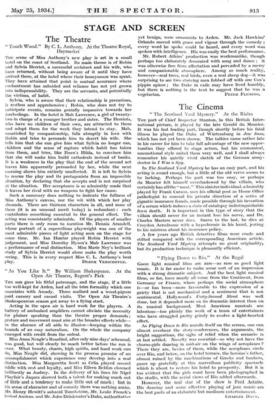STAGE AND SCREEN The Theatre
" Touch Wood." By C. L. Anthony. At the Theatre Royal, Haymarket Tat scene of Miss Anthony's new play is Set in a small hotel on the coast of Scotland. Its main theme is of Robin and Sylvia Herriot, a successful architect and his wife, who have returned, without being aware of it until they have arrived there, at the hotel where their honeymoon was spent. They have attained that point in mutual assurance where enchantment has subsided and reliance has not yet grown into indispensability. They are the servants, and potentially the victims, of habit.
Sylvia, who is aware that their relationship is precarious, is restless and apprehensive ; Robin, who does not try to anticipate events, remains genially impassive towards- her forebodings. In the hotel is Mab Lawrence, a girl of twenty- two in charge of a younger brother and sister. The Herriots, who have no children of their own, are attracted to them and adopt them for the week they intend to stay. Mab, unsatisfied by companionship, falls abruptly in love with Robin and tries to persuade him to desert his wife. She tells him that she can give him what Sylvia no longer can, children and the sense of rapture which habit has taken from them, and tries, like Ibsen's Hilda, to convince him that she will make him build cathedrals instead of banks. It is a weakness in the play that the end of the second act leaves him apparently persuaded by her, while the next morning shows him entirely unaffected. It is left to Sylvia to rescue the play and its protagonists from an impossible situation, by declaring that she accepts and is not surprised at the situation. Her acceptance is so admirably made that it leaves her rival with no weapons to fight her cause.
Such a summary does nothing to indicate the fullness of Miss Anthony's canvas, nor the wit with which her play abounds. There are thirteen characters in all, and none of them (it is an unusual merit today) is redundant : each contributes something essential to the general effect. The acting was consistently admirable. Of the players of smaller parts there is only room to mention Mr. Dennis Mundell, whose portrait of a supercilious playwright was one of the most admirable pieces of light acting seen on the stage for some time. Mr. Ian Hunter played Robin Herriot with judgement, and Miss Dorothy Hyson's Mab Lawrence was a performance of real distinction. Miss Marie Ney's brilliant study of Sylvia Herriot would alone make the play worth seeing.. This is in every respect Miss C. L. Anthony's best
















































 Previous page
Previous page